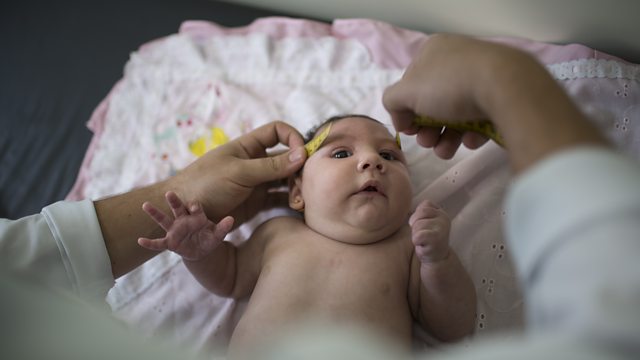
Brazilian Babies Born with Microcephaly
Brazilian babies born with microcephaly;El Niño;The Anthropocene;Migrants struggle in sub-zero temperatures;Metallic Hydrogen;Alex the parrot;Elements added to Periodic Table
Each year in Brazil approximately 150 babies are born with a serious condition called microcephaly, where the brain has not developed fully before birth. But last year there were almost 4,000 cases. The situation is so serious that some doctors are even advising women to delay trying to get pregnant in case they contract the Zika virus, which is thought to be linked to the microcephaly epidemic. UK family doctor, Ann Robinson, and Dr Regina Coeli, a paediatric infectologist at Oswaldo Cruz Hospital in Recife, talk to Claudia Hammond about microcephaly and Zika virus.
El Niño
The El Niño weather phenomenon is expected to be the most intense in nearly two decades. It is releasing vast quantities of heat normally stored in the Pacific, causing floods, droughts and fires. Roland Pease talks to Professor Sue Page from University of Leicester and Professor Martin Wooster from King’s College London who are studying the Indonesian fires exacerbated by the current El Niño event. They describe the unpleasant choking smoke they experienced on their recent visit to Indonesia.
Start of the Anthropocene
The Anthropocene is a term formulated in 2000 to denote the present age, where humans are dramatically altering many geologically important conditions. It might already have penetrated the surface of popular culture, but it is not an officially recognised term. As far as geologists are concerned, we are still in the Holocene, which begins around 11,700 years ago with the end of the last Ice Age. A working group will put its evidence and recommendations about formalising the Anthropocene before the International Commission on Stratigraphy. Jonathan Amos talks to one of the group, geologist Dr Colin Waters of the British Geological Survey, about its latest assessment of when the Anthropocene began.
Migrants Struggle in Sub-Zero Temperatures
Medics working at refugee aid camps in the Balkans say they are seeing a spike in the number of migrants falling ill because of the cold weather. The ���˿���'s Global Health correspondent Tulip Mazumdar reports from a medical clinic in Macedonia.
Metallic Hydrogen
Scientists think they have come close to creating a metallic state of hydrogen more than 80 years after it was first predicted. Dr Ross Howie from the HPSTAR institute in Shanghai explains how he and his colleagues from Edinburgh University exerted the equivalent pressure at the centre of the Earth on a tiny amount of hydrogen to create a mixed-state form of hydrogen.
Alex the Mathematical Parrot
Alex Bellos explores the foundations of our ability to understand numbers. What are the fundamental numerical skills we share with other animals? What accounts for our species’ unique abilities to do calculations which other creatures cannot? Alex Bellos tells the amazing story of Alex, the African grey parrot, and meets Dr Irene Pepperberg who guided her feathered pupil to extraordinary mathematical achievements, together with a former labmate of Alex’s, Griffin.
Elements Added to Periodic Table
Four chemical elements have been formally added to the periodic table, completing the scheme's seventh row. They are the first to be included in the table since 2011, when elements 114 and 116 were added. The new additions were formally verified by the International Union of Pure and Applied Chemistry (IUPAC) on 30 December 2015. The body announced that a team of Russian and American researchers had provided sufficient evidence to claim the discovery of elements 115, 117 and 118. Andrea Sella, Professor of Inorganic Chemistry at University College London, explained to Razia Iqbal why he was so impressed by this work.
(Photo caption: A baby girl born with microcephaly has her head measured by a neurologist © AP Photo/Felipe Dana)
The Science Hour was presented by Claudia Hammond with comments from ���˿��� Science Correspondent Jonathan Amos
Editor: Deborah Cohen
Last on
More episodes
Previous
Broadcasts
- Sat 9 Jan 2016 09:06GMT���˿��� World Service Australasia
- Sat 9 Jan 2016 23:06GMT���˿��� World Service except News Internet
- Sun 10 Jan 2016 02:06GMT���˿��� World Service Australasia
- Sun 10 Jan 2016 11:06GMT���˿��� World Service except Australasia & News Internet
- Sun 10 Jan 2016 14:06GMT���˿��� World Service Australasia
- Mon 11 Jan 2016 06:06GMT���˿��� World Service South Asia
Podcast
-
![]()
Unexpected Elements
The news you know, the science you don't

